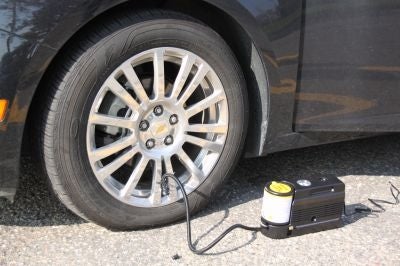Why your next car may not have a spare wheel

Chevrolet has chosen to remove the spare wheel from one of its US models, opting instead to include a puncture repair kit, just as Michelin announces a tire that can't puncture - does this mean the end of the spare wheel?
A long-held fixture in today's cars, spare wheels are little thought about but often essential, especially when a long distance from home. Statistics suggest European drivers suffer a puncture every 75,000 kilometers on European roads, although the number falls to every 3,000 km on some roads in Asia.
Buyers of the new Chevrolet Cruze Eco, however, will be among the first modern motorists who need not think about the spare, as the automaker has opted to include an "inflator kit" rather than a full tire to reduce the weight on the ultra-efficient model.
Chevrolet says that on-board tire pressure monitors, which are widely fitted on newer cars, have made spare tires unnecessary, as most problems can be detected well in advance.
So it announced last week that it's opted to do away with the heavy spare tire, opting instead for an electronic tire inflator and a sealant which can temporarily patch holes up to a quarter of an inch in diameter.
It says that the new solution should be enough to repressurize the tire and coax the car to a dealer for a proper repair, although in a serious situation customers can hit an emergency assistance button to summon roadside help.
It's a neat idea, and one which could catch on quickly - although at last week's Challenge Bibendum event in Germany Michelin unveiled an innovation which could make punctures themselves extinct.
It seems that the French tire manufacturer may finally have nailed the key to a 'flat-free tire', using an interior material capable of plugging the tire as soon as a hole appears.
Michelin says that it's filed 15 patents for the "unprecedented technological breakthrough," which reports suggest could be in use as early as 2014 with considerable environmental benefits including reduced rubber usage and reduced fuel consumption.
Join our commenting forum
Join thought-provoking conversations, follow other Independent readers and see their replies
Comments
Bookmark popover
Removed from bookmarks